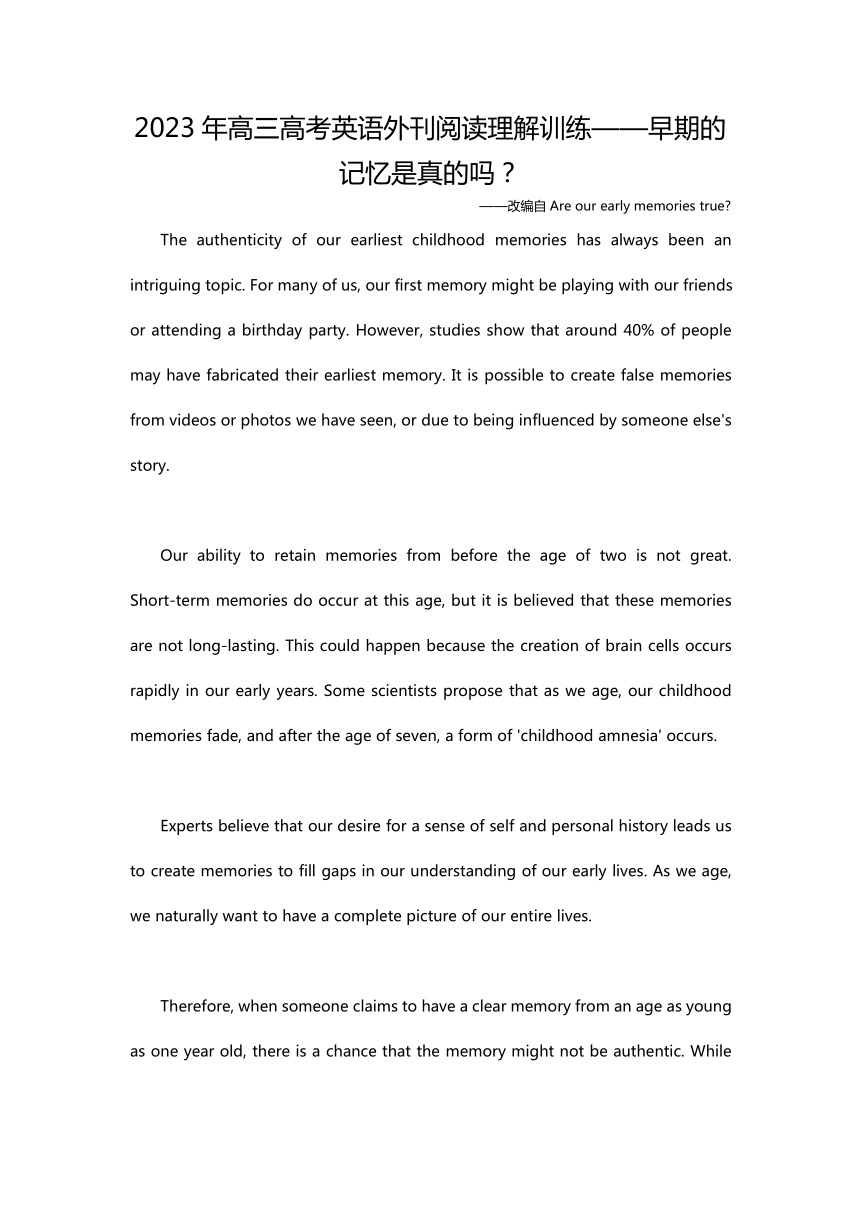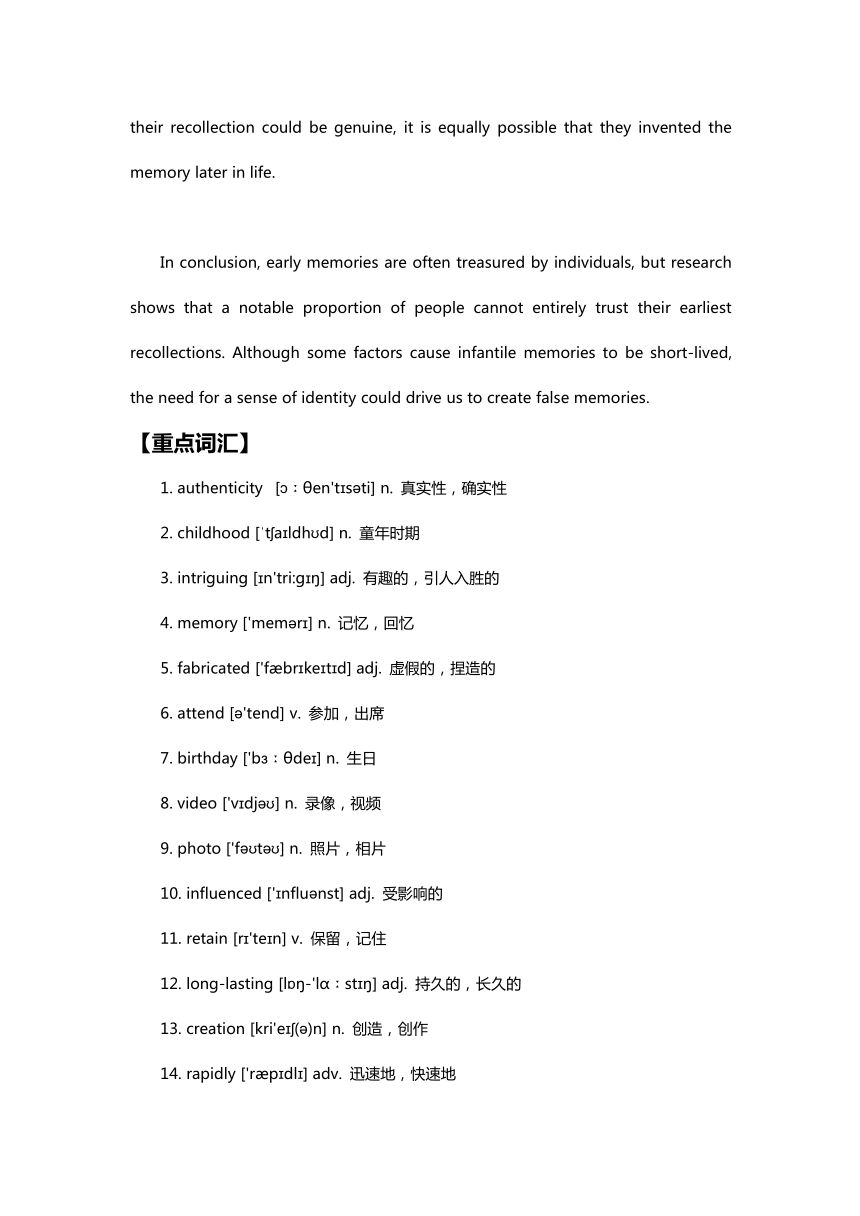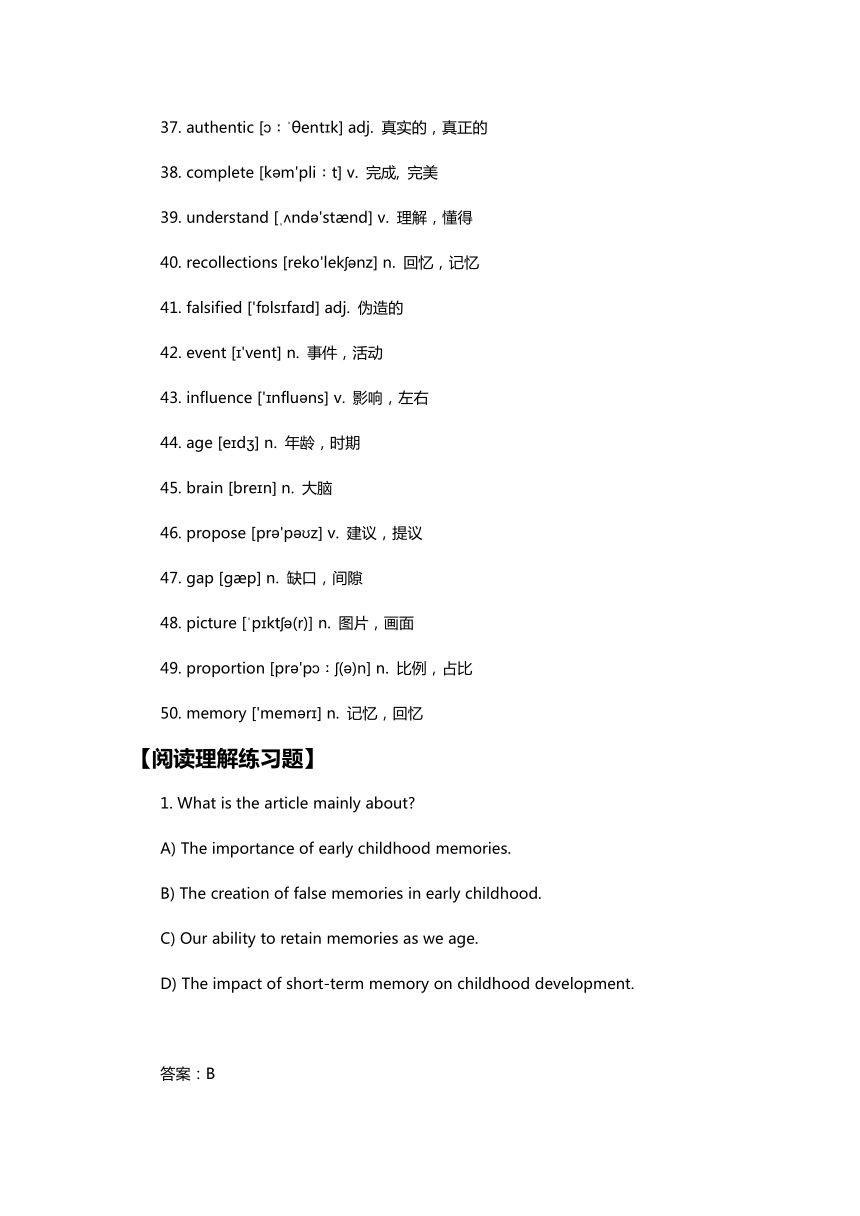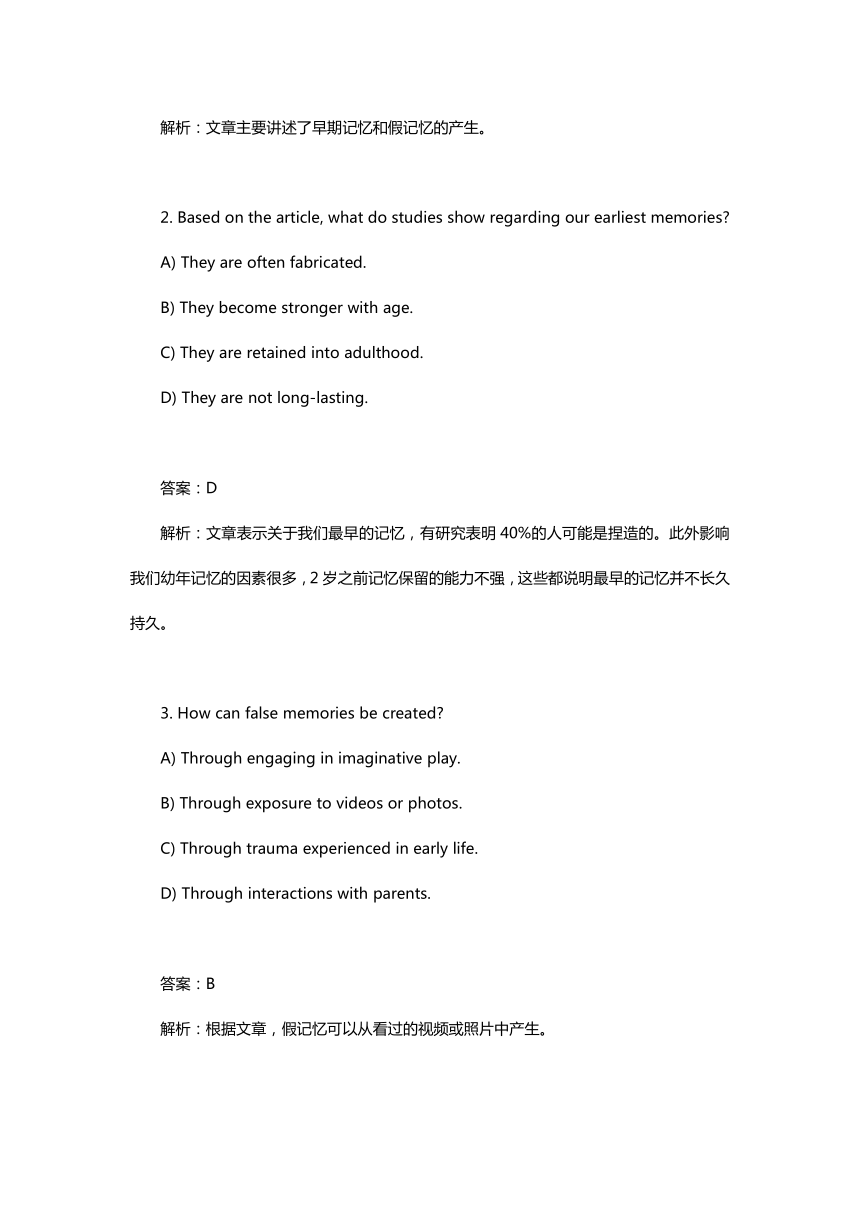2023年高三高考英语外刊阅读理解训练:早期的记忆是真的吗?(含解析)
文档属性
| 名称 | 2023年高三高考英语外刊阅读理解训练:早期的记忆是真的吗?(含解析) |  | |
| 格式 | docx | ||
| 文件大小 | 20.5KB | ||
| 资源类型 | 教案 | ||
| 版本资源 | 通用版 | ||
| 科目 | 英语 | ||
| 更新时间 | 2023-05-11 13:44:42 | ||
图片预览





文档简介
2023年高三高考英语外刊阅读理解训练——早期的记忆是真的吗?
——改编自Are our early memories true
The authenticity of our earliest childhood memories has always been an intriguing topic. For many of us, our first memory might be playing with our friends or attending a birthday party. However, studies show that around 40% of people may have fabricated their earliest memory. It is possible to create false memories from videos or photos we have seen, or due to being influenced by someone else's story.
Our ability to retain memories from before the age of two is not great. Short-term memories do occur at this age, but it is believed that these memories are not long-lasting. This could happen because the creation of brain cells occurs rapidly in our early years. Some scientists propose that as we age, our childhood memories fade, and after the age of seven, a form of 'childhood amnesia' occurs.
Experts believe that our desire for a sense of self and personal history leads us to create memories to fill gaps in our understanding of our early lives. As we age, we naturally want to have a complete picture of our entire lives.
Therefore, when someone claims to have a clear memory from an age as young as one year old, there is a chance that the memory might not be authentic. While their recollection could be genuine, it is equally possible that they invented the memory later in life.
In conclusion, early memories are often treasured by individuals, but research shows that a notable proportion of people cannot entirely trust their earliest recollections. Although some factors cause infantile memories to be short-lived, the need for a sense of identity could drive us to create false memories.
【重点词汇】
1. authenticity [ θen't s ti] n. 真实性,确实性
2. childhood [ t a ldh d] n. 童年时期
3. intriguing [ n'tri:g ] adj. 有趣的,引人入胜的
4. memory ['mem r ] n. 记忆,回忆
5. fabricated ['f br ke t d] adj. 虚假的,捏造的
6. attend [ 'tend] v. 参加,出席
7. birthday ['b θde ] n. 生日
8. video ['v dj ] n. 录像,视频
9. photo ['f t ] n. 照片,相片
10. influenced [' nflu nst] adj. 受影响的
11. retain [r 'te n] v. 保留,记住
12. long-lasting [l -'lɑ st ] adj. 持久的,长久的
13. creation [kri'e ( )n] n. 创造,创作
14. rapidly ['r p dl ] adv. 迅速地,快速地
15. propose [pr 'p z] v. 建议,提议
16. amnesia [ m'ni:zj ] n. 健忘症
17. desire [d 'za ] n. 渴望,愿望
18. personal ['p s( )n( )l] adj. 个人的,私人的
19. history ['h st ri] n. 历史,过去事情
plete [k m'pli t] adj. 完整的,彻底的
21. recollection ['reko'lek ( )n] n. 回忆,记忆
22. genuine ['d enju n] adj. 真正的,真实的
23. equally ['i:kw li] adv. 同样地,平等地
24. invented [ n'vent d] adj. 创造的,编造的
25. conclusion [k n klu: ( )n] n. 结论,结束
26. treasured ['tre d] adj. 珍贵的,被珍视的
27. notable ['n t b( )l] adj. 显著的,值得注意的
28. proportion [pr 'p ( )n] n. 比例,占比
29. entirely [ n'ta rli] adv. 完全地,彻底地
30. trust [tr st] v. 信任,相信
31. factors ['f kt z] n. 因素
32. infantile [' nf nta l] adj. 幼儿的,婴幼儿的
33. short-lived [' ta vd] adj. 短暂的,短命的
34. need [ni:d] n. 需要,需求
35. identity [a 'dent ti] n. 身份,认同
36. drive [dra v] v. 驱动,推动
37. authentic [ θent k] adj. 真实的,真正的
plete [k m'pli t] v. 完成, 完美
39. understand [ nd 'st nd] v. 理解,懂得
40. recollections [reko'lek nz] n. 回忆,记忆
41. falsified ['f ls fa d] adj. 伪造的
42. event [ 'vent] n. 事件,活动
43. influence [' nflu ns] v. 影响,左右
44. age [e d ] n. 年龄,时期
45. brain [bre n] n. 大脑
46. propose [pr 'p z] v. 建议,提议
47. gap [ɡ p] n. 缺口,间隙
48. picture [ p kt (r)] n. 图片,画面
49. proportion [pr 'p ( )n] n. 比例,占比
50. memory ['mem r ] n. 记忆,回忆
【阅读理解练习题】
1. What is the article mainly about
A) The importance of early childhood memories.
B) The creation of false memories in early childhood.
C) Our ability to retain memories as we age.
D) The impact of short-term memory on childhood development.
答案:B
解析:文章主要讲述了早期记忆和假记忆的产生。
2. Based on the article, what do studies show regarding our earliest memories
A) They are often fabricated.
B) They become stronger with age.
C) They are retained into adulthood.
D) They are not long-lasting.
答案:D
解析:文章表示关于我们最早的记忆,有研究表明40%的人可能是捏造的。此外影响我们幼年记忆的因素很多,2岁之前记忆保留的能力不强,这些都说明最早的记忆并不长久持久。
3. How can false memories be created
A) Through engaging in imaginative play.
B) Through exposure to videos or photos.
C) Through trauma experienced in early life.
D) Through interactions with parents.
答案:B
解析:根据文章,假记忆可以从看过的视频或照片中产生。
4. What does the author propose as a reason for children's inability to retain memories from before the age of two
A) The rapid creation of brain cells.
B) A lack of experiences to create memories from.
C) The underdevelopment of the hippocampus.
D) The influence of outside stimuli.
答案:A
解析:文章指出,儿童在两岁之前记忆保留能力不强,原因被认为是大脑细胞的迅速生成。
5. What is "childhood amnesia"
A) An inability to recall memories from later in childhood.
B) A form of psychological trauma experienced in early life.
C) The inability to retain long-term memories from before the age of seven.
D) A phenomenon where people imagine events from their early years.
答案:C
解析:文章提到,“童年遗忘症”是指7岁以前无法保留长期记忆。
6. According to the passage, what drives people to create false memories
A) The influence of others' stories about their early lives.
B) A desire for a sense of self and a complete personal history.
C) The need to fill gaps in long-term memory.
D) The fading of early childhood memories.
答案:B
解析:根据文章,人们想要一个完整的自我形象和个人历史,因此可能会产生假记忆。
7. What does the author imply about people who claim to have clear memories from as young as one year old
A) Their memories are likely authentic.
B) Their memories are probably less reliable than they believe.
C) They are highly imaginative individuals.
D) They experience greater childhood amnesia.
答案:B
解析:文章指出断言自己从1岁开始就有清晰的记忆可能是捏造的。虽然他们的回忆可能是真实的,但同样可能是后来编造出来的记忆。
8. What is the author's attitude towards early memories
A) They are always authentic and reliable.
B) They are often unreliable, but still treasured by individuals.
C) They are difficult to create in early childhood.
D) Their importance fades with age.
答案:B
解析:文章指出一定比例的人不能完全信任自己最早的回忆,但这并没有贬低重视早期回忆的价值。
【全文逐句对照翻译】
我们最早的童年记忆的真实性一直是一个有趣的话题。
The authenticity of our earliest childhood memories has always been an intriguing topic.
对于我们中的许多人来说,我们最初的记忆可能是和朋友一起玩耍或参加生日聚会。
For many of us, our first memory might be playing with our friends or attending a birthday party.
然而,研究表明,大约40%的人可能捏造了他们最早的记忆。
However, studies show that around 40% of people may have fabricated their earliest memory.
我们可能会从我们看过的视频或照片中产生错误的记忆,或者由于受到别人的故事的影响。
It is possible to create false memories from videos or photos we have seen, or due to being influenced by someone else's story.
我们保留两岁以前记忆的能力不是很好。
Our ability to retain memories from before the age of two is not great.
这个年龄段确实会有短期记忆,但人们认为这些记忆不会持久。
Short-term memories do occur at this age, but it is believed that these memories are not long-lasting.
这可能发生,因为脑细胞的产生在我们的早期发生得很快。
This could happen because the creation of brain cells occurs rapidly in our early years.
一些科学家提出,随着年龄的增长,我们的童年记忆会逐渐消失,七岁以后,就会出现一种“童年健忘症”。
Some scientists propose that as we age, our childhood memories fade, and after the age of seven, a form of 'childhood amnesia' occurs.
专家认为,我们对自我意识和个人历史的渴望导致我们创造记忆,以填补我们对早期生活的理解空白。
Experts believe that our desire for a sense of self and personal history leads us to create memories to fill gaps in our understanding of our early lives.
随着年龄的增长,我们自然希望对自己的整个生活有一个完整的了解。
As we age, we naturally want to have a complete picture of our entire lives.
因此,当有人声称从一岁开始就有清晰的记忆时,有可能记忆不是真实的。
Therefore, when someone claims to have a clear memory from an age as young as one year old, there is a chance that the memory might not be authentic.
虽然他们的回忆可能是真实的,但同样有可能是他们在以后的生活中虚构的记忆。
While their recollection could be genuine, it is equally possible that they invented the memory later in life.
总之,早期的记忆通常被个人珍视,但研究表明,相当一部分人不能完全相信他们最早的记忆。
In conclusion, early memories are often treasured by individuals, but research shows that a notable proportion of people cannot entirely trust their earliest recollections.
虽然有些因素导致婴儿记忆短暂,但对认同感的需求可能会驱使我们创造错误的记忆。
Although some factors cause infantile memories to be short-lived, the need for a sense of identity could drive us to create false memories.
——改编自Are our early memories true
The authenticity of our earliest childhood memories has always been an intriguing topic. For many of us, our first memory might be playing with our friends or attending a birthday party. However, studies show that around 40% of people may have fabricated their earliest memory. It is possible to create false memories from videos or photos we have seen, or due to being influenced by someone else's story.
Our ability to retain memories from before the age of two is not great. Short-term memories do occur at this age, but it is believed that these memories are not long-lasting. This could happen because the creation of brain cells occurs rapidly in our early years. Some scientists propose that as we age, our childhood memories fade, and after the age of seven, a form of 'childhood amnesia' occurs.
Experts believe that our desire for a sense of self and personal history leads us to create memories to fill gaps in our understanding of our early lives. As we age, we naturally want to have a complete picture of our entire lives.
Therefore, when someone claims to have a clear memory from an age as young as one year old, there is a chance that the memory might not be authentic. While their recollection could be genuine, it is equally possible that they invented the memory later in life.
In conclusion, early memories are often treasured by individuals, but research shows that a notable proportion of people cannot entirely trust their earliest recollections. Although some factors cause infantile memories to be short-lived, the need for a sense of identity could drive us to create false memories.
【重点词汇】
1. authenticity [ θen't s ti] n. 真实性,确实性
2. childhood [ t a ldh d] n. 童年时期
3. intriguing [ n'tri:g ] adj. 有趣的,引人入胜的
4. memory ['mem r ] n. 记忆,回忆
5. fabricated ['f br ke t d] adj. 虚假的,捏造的
6. attend [ 'tend] v. 参加,出席
7. birthday ['b θde ] n. 生日
8. video ['v dj ] n. 录像,视频
9. photo ['f t ] n. 照片,相片
10. influenced [' nflu nst] adj. 受影响的
11. retain [r 'te n] v. 保留,记住
12. long-lasting [l -'lɑ st ] adj. 持久的,长久的
13. creation [kri'e ( )n] n. 创造,创作
14. rapidly ['r p dl ] adv. 迅速地,快速地
15. propose [pr 'p z] v. 建议,提议
16. amnesia [ m'ni:zj ] n. 健忘症
17. desire [d 'za ] n. 渴望,愿望
18. personal ['p s( )n( )l] adj. 个人的,私人的
19. history ['h st ri] n. 历史,过去事情
plete [k m'pli t] adj. 完整的,彻底的
21. recollection ['reko'lek ( )n] n. 回忆,记忆
22. genuine ['d enju n] adj. 真正的,真实的
23. equally ['i:kw li] adv. 同样地,平等地
24. invented [ n'vent d] adj. 创造的,编造的
25. conclusion [k n klu: ( )n] n. 结论,结束
26. treasured ['tre d] adj. 珍贵的,被珍视的
27. notable ['n t b( )l] adj. 显著的,值得注意的
28. proportion [pr 'p ( )n] n. 比例,占比
29. entirely [ n'ta rli] adv. 完全地,彻底地
30. trust [tr st] v. 信任,相信
31. factors ['f kt z] n. 因素
32. infantile [' nf nta l] adj. 幼儿的,婴幼儿的
33. short-lived [' ta vd] adj. 短暂的,短命的
34. need [ni:d] n. 需要,需求
35. identity [a 'dent ti] n. 身份,认同
36. drive [dra v] v. 驱动,推动
37. authentic [ θent k] adj. 真实的,真正的
plete [k m'pli t] v. 完成, 完美
39. understand [ nd 'st nd] v. 理解,懂得
40. recollections [reko'lek nz] n. 回忆,记忆
41. falsified ['f ls fa d] adj. 伪造的
42. event [ 'vent] n. 事件,活动
43. influence [' nflu ns] v. 影响,左右
44. age [e d ] n. 年龄,时期
45. brain [bre n] n. 大脑
46. propose [pr 'p z] v. 建议,提议
47. gap [ɡ p] n. 缺口,间隙
48. picture [ p kt (r)] n. 图片,画面
49. proportion [pr 'p ( )n] n. 比例,占比
50. memory ['mem r ] n. 记忆,回忆
【阅读理解练习题】
1. What is the article mainly about
A) The importance of early childhood memories.
B) The creation of false memories in early childhood.
C) Our ability to retain memories as we age.
D) The impact of short-term memory on childhood development.
答案:B
解析:文章主要讲述了早期记忆和假记忆的产生。
2. Based on the article, what do studies show regarding our earliest memories
A) They are often fabricated.
B) They become stronger with age.
C) They are retained into adulthood.
D) They are not long-lasting.
答案:D
解析:文章表示关于我们最早的记忆,有研究表明40%的人可能是捏造的。此外影响我们幼年记忆的因素很多,2岁之前记忆保留的能力不强,这些都说明最早的记忆并不长久持久。
3. How can false memories be created
A) Through engaging in imaginative play.
B) Through exposure to videos or photos.
C) Through trauma experienced in early life.
D) Through interactions with parents.
答案:B
解析:根据文章,假记忆可以从看过的视频或照片中产生。
4. What does the author propose as a reason for children's inability to retain memories from before the age of two
A) The rapid creation of brain cells.
B) A lack of experiences to create memories from.
C) The underdevelopment of the hippocampus.
D) The influence of outside stimuli.
答案:A
解析:文章指出,儿童在两岁之前记忆保留能力不强,原因被认为是大脑细胞的迅速生成。
5. What is "childhood amnesia"
A) An inability to recall memories from later in childhood.
B) A form of psychological trauma experienced in early life.
C) The inability to retain long-term memories from before the age of seven.
D) A phenomenon where people imagine events from their early years.
答案:C
解析:文章提到,“童年遗忘症”是指7岁以前无法保留长期记忆。
6. According to the passage, what drives people to create false memories
A) The influence of others' stories about their early lives.
B) A desire for a sense of self and a complete personal history.
C) The need to fill gaps in long-term memory.
D) The fading of early childhood memories.
答案:B
解析:根据文章,人们想要一个完整的自我形象和个人历史,因此可能会产生假记忆。
7. What does the author imply about people who claim to have clear memories from as young as one year old
A) Their memories are likely authentic.
B) Their memories are probably less reliable than they believe.
C) They are highly imaginative individuals.
D) They experience greater childhood amnesia.
答案:B
解析:文章指出断言自己从1岁开始就有清晰的记忆可能是捏造的。虽然他们的回忆可能是真实的,但同样可能是后来编造出来的记忆。
8. What is the author's attitude towards early memories
A) They are always authentic and reliable.
B) They are often unreliable, but still treasured by individuals.
C) They are difficult to create in early childhood.
D) Their importance fades with age.
答案:B
解析:文章指出一定比例的人不能完全信任自己最早的回忆,但这并没有贬低重视早期回忆的价值。
【全文逐句对照翻译】
我们最早的童年记忆的真实性一直是一个有趣的话题。
The authenticity of our earliest childhood memories has always been an intriguing topic.
对于我们中的许多人来说,我们最初的记忆可能是和朋友一起玩耍或参加生日聚会。
For many of us, our first memory might be playing with our friends or attending a birthday party.
然而,研究表明,大约40%的人可能捏造了他们最早的记忆。
However, studies show that around 40% of people may have fabricated their earliest memory.
我们可能会从我们看过的视频或照片中产生错误的记忆,或者由于受到别人的故事的影响。
It is possible to create false memories from videos or photos we have seen, or due to being influenced by someone else's story.
我们保留两岁以前记忆的能力不是很好。
Our ability to retain memories from before the age of two is not great.
这个年龄段确实会有短期记忆,但人们认为这些记忆不会持久。
Short-term memories do occur at this age, but it is believed that these memories are not long-lasting.
这可能发生,因为脑细胞的产生在我们的早期发生得很快。
This could happen because the creation of brain cells occurs rapidly in our early years.
一些科学家提出,随着年龄的增长,我们的童年记忆会逐渐消失,七岁以后,就会出现一种“童年健忘症”。
Some scientists propose that as we age, our childhood memories fade, and after the age of seven, a form of 'childhood amnesia' occurs.
专家认为,我们对自我意识和个人历史的渴望导致我们创造记忆,以填补我们对早期生活的理解空白。
Experts believe that our desire for a sense of self and personal history leads us to create memories to fill gaps in our understanding of our early lives.
随着年龄的增长,我们自然希望对自己的整个生活有一个完整的了解。
As we age, we naturally want to have a complete picture of our entire lives.
因此,当有人声称从一岁开始就有清晰的记忆时,有可能记忆不是真实的。
Therefore, when someone claims to have a clear memory from an age as young as one year old, there is a chance that the memory might not be authentic.
虽然他们的回忆可能是真实的,但同样有可能是他们在以后的生活中虚构的记忆。
While their recollection could be genuine, it is equally possible that they invented the memory later in life.
总之,早期的记忆通常被个人珍视,但研究表明,相当一部分人不能完全相信他们最早的记忆。
In conclusion, early memories are often treasured by individuals, but research shows that a notable proportion of people cannot entirely trust their earliest recollections.
虽然有些因素导致婴儿记忆短暂,但对认同感的需求可能会驱使我们创造错误的记忆。
Although some factors cause infantile memories to be short-lived, the need for a sense of identity could drive us to create false memories.
